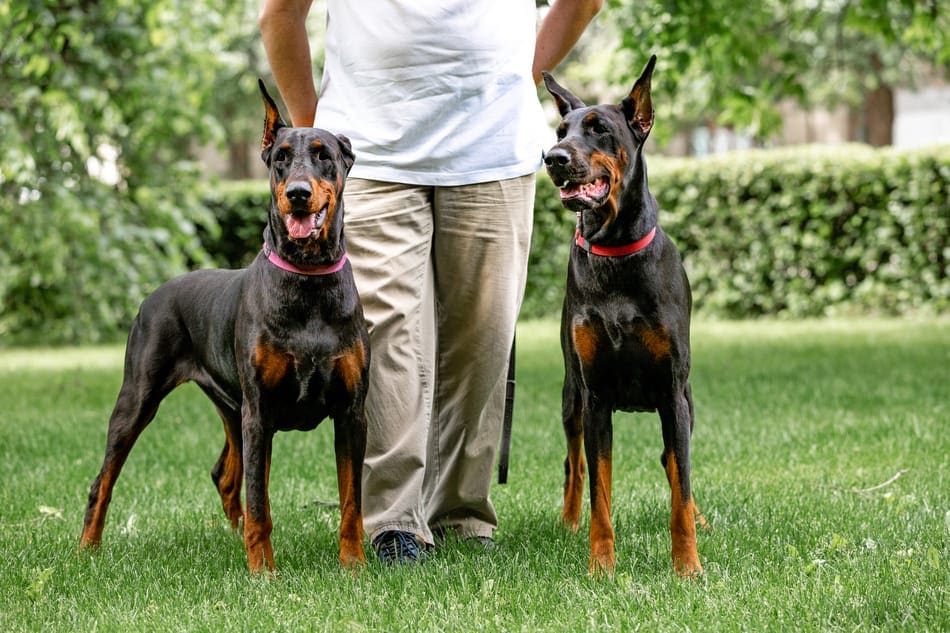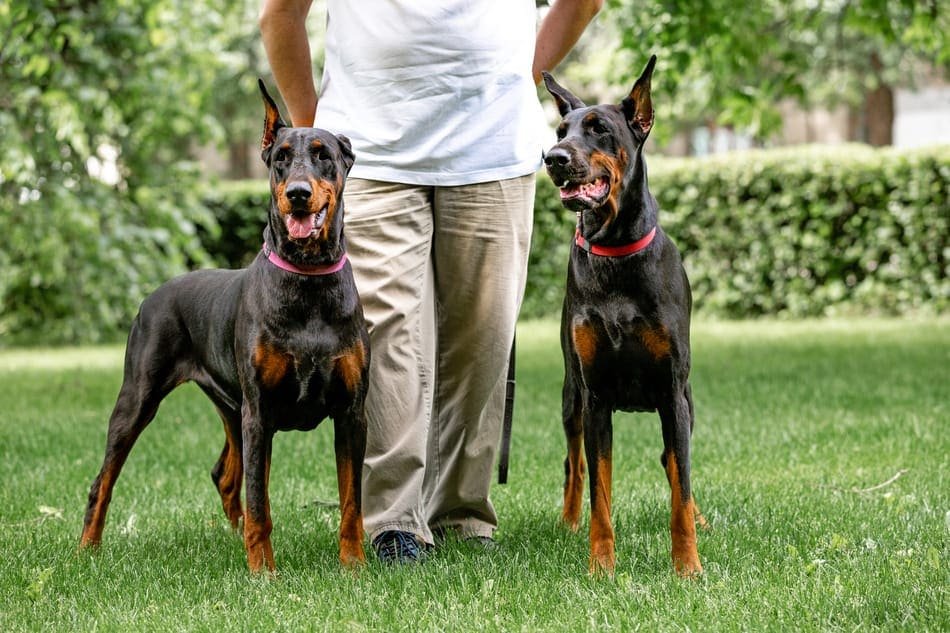Doberman Pinschers are renowned for their protective nature, making them one of the most sought-after guard dog breeds. These loyal and fearless dogs possess a natural instinct to safeguard their family and territory. With their imposing presence and innate vigilance, Dobermans have a reputation for being highly protective companions.
Originating in Germany in the late 19th century, these dogs were originally bred for protection and security work. Their strong guarding instincts were shaped through careful breeding to ensure they possess the ideal traits of a dependable protector. According to studies, Doberman Pinschers are considered one of the top ten most protective dog breeds, with an impressive ability to perceive and react to potential threats. This makes them an excellent choice for those seeking a four-legged guardian for their home and loved ones.
Doberman Pinschers are known for their protective nature. They are a vigilant and alert breed, making them excellent guard dogs. Their loyalty and fearlessness enable them to protect their families and property. With proper training and socialization, they can be reliable and obedient protectors. They have a strong instinct to protect their loved ones, making them a popular choice for security purposes. However, it’s important to note that individual temperament can vary, so early socialization and training are crucial to ensure a well-rounded and protective Doberman Pinscher.

Are Doberman Pinschers Protective?
Doberman Pinschers are often associated with protection and security. But just how protective are these dogs? Are they truly the ideal guard dogs? In this article, we will explore the protective nature of Doberman Pinschers, their temperament, and what makes them a popular choice for security purposes.
Temperament and Characteristics
Doberman Pinschers have a reputation for being protective of their families and territory. These dogs are known for their loyalty, intelligence, and trainability. They are naturally alert and have a keen instinct to protect their loved ones.
Their muscular build and intimidating appearance also contribute to their effectiveness as guard dogs. With their sleek and powerful physique, Dobermans can be quite intimidating to potential intruders. However, it is important to note that aggression is not a desirable trait in Doberman Pinschers. Proper training and socialization are essential to ensure they are protective without being overly aggressive.
Additionally, Dobermans are known for their energy and stamina. They require regular exercise to keep them physically and mentally stimulated. This energy and drive make them highly alert and ready to respond to any potential threats.
Training and Socialization
Training plays a crucial role in shaping the protective nature of a Doberman Pinscher. Early socialization and obedience training are essential to ensure they know how to react appropriately to different situations. By exposing them to various environments, people, and other animals from a young age, Dobermans learn to distinguish between potential threats and friendly encounters.
Positive reinforcement training methods work best with these intelligent dogs. Consistent and reward-based training helps establish a strong bond with their owners and reinforces their protective instincts in a controlled manner. With the right training, a Doberman Pinscher can become a reliable and well-behaved companion.
Security and Guard Dog Abilities
Doberman Pinschers possess a number of qualities that make them suitable for security and guard dog roles. Their large size, athleticism, and imposing appearance make them a visually deterrent presence. The muscles of a Doberman Pinscher are well-developed, making them physically capable of protecting their family and property if needed.
In addition to their intimidating appearance, Doberman Pinschers have a variety of protective instincts. They are naturally alert and have a strong sense of loyalty towards their family members. If they sense a potential threat, they can become highly protective and may bark, growl, or take defensive action to safeguard their loved ones.
However, it’s important to note that not all Dobermans will excel as guard dogs. Some individual dogs may have a more cautious or reserved temperament, making them less suitable for intense guarding duties. Choosing a Doberman Pinscher with a suitable temperament and working with a reputable breeder or trainer can increase the chances of having a dog that excels in protective roles.
Proper Ownership and Responsibility
Owning a protective breed like a Doberman Pinscher comes with a great deal of responsibility. The following are important factors to consider:
- Understanding the breed’s needs: Doberman Pinschers require regular exercise, mental stimulation, and social interaction to thrive.
- Training and socialization: Proper training and socialization are crucial to harness their protective instincts in a controlled manner.
- Responsible breeding: Working with reputable breeders who prioritize temperament and health can help ensure a well-rounded Doberman Pinscher.
- Legal considerations: Some areas have specific laws or regulations for owning certain breeds. Ensure compliance with local regulations.
- Liability insurance: Depending on local regulations, having liability insurance may be necessary when owning a protective breed.
Closing Thoughts
Doberman Pinschers have a protective nature that makes them well-suited for security purposes. Their loyal temperament, trainability, and physical attributes contribute to their effectiveness as guard dogs. However, responsible ownership, proper training, and socialization are essential to ensure they are protective without being overly aggressive. With the right care and training, a Doberman Pinscher can be a loving and protective companion for individuals or families in need of additional security.
Key Takeaways: Are Doberman Pinschers Protective?
Doberman Pinschers are known for their protective nature.
They are loyal and will defend their family when necessary.
Proper training and socialization are essential to ensure a well-behaved and balanced Doberman Pinscher.
They have a strong instinct to protect and can be territorial if not properly trained and socialized.
Their protective nature makes them excellent guard dogs.
Frequently Asked Questions
Dogs are known to be protective of their family, but when it comes to Doberman Pinschers, their protective nature is often a topic of discussion. Here are some common questions related to the protective nature of Doberman Pinschers.
1. What makes Doberman Pinschers protective?
Doberman Pinschers are thought to be naturally protective due to their breeding history. They were originally bred as guard dogs and have retained that instinct over time. Additionally, Dobermans are highly trainable, intelligent, and loyal, which further contributes to their protective nature.
They are known to form strong bonds with their owners and will go to great lengths to protect them. Their size, strength, and agility also make them a physically imposing presence, which can act as a deterrent to potential threats.
2. Are Doberman Pinschers protective of children?
Yes, Doberman Pinschers can be protective of children. They often develop a strong bond with children in their family and consider them part of their pack. If a Doberman senses any danger or perceives a threat towards the children, they will instinctively jump into action to protect them.
However, it’s important to note that proper training and socialization are essential to ensure that a Doberman interacts well with children and understands appropriate behavior. Early socialization and positive reinforcement training can help shape their protective instincts in a positive way.
3. Can Doberman Pinschers be selectively protective?
Yes, Doberman Pinschers have the ability to be selectively protective. While they are generally protective of their family as a whole, they can also exhibit a discerning nature in certain situations.
For example, if a stranger approaches their family aggressively or poses a threat, a Doberman will likely display protective behavior. On the other hand, if someone enters the home with a friendly demeanor and the Doberman perceives no threat, they may not exhibit the same level of protective behavior.
4. How can I ensure my Doberman Pinscher’s protective instincts are balanced?
Balancing your Doberman Pinscher’s protective instincts involves a combination of training, socialization, and responsible ownership. It’s important to expose your Doberman to different people, situations, and environments from a young age to help them develop a well-rounded temperament.
Providing consistent training that focuses on obedience, impulse control, and proper behavior around strangers can help shape their protective instincts in a balanced way. Positive reinforcement techniques, such as rewards and praise, can be effective in reinforcing desired behavior.
5. Are Doberman Pinschers naturally aggressive or just protective?
Doberman Pinschers are not naturally aggressive, but their protective nature can sometimes be misinterpreted as aggression. When well-bred, properly trained, and socialized, Dobermans are typically friendly and affectionate towards their family and other familiar people.
However, their protective instincts may cause them to be cautious and vigilant around strangers or in unfamiliar situations. It’s important for owners to understand and properly manage their Doberman’s protective behavior through training and socialization to prevent any potential aggression.

DOBERMAN PINSCHERS ARE GREAT PERSONAL PROTECTORS
Doberman Pinschers are known for their protective nature, making them an excellent choice for those seeking a loyal and watchful companion. With their strong instincts and natural alertness, they instinctively protect their family and property.
These intelligent dogs are quick to recognize potential threats and take action, which is why they are often used as guard dogs and police dogs. It’s important to note, however, that proper training and socialization are crucial to ensure that their protective instincts are directed appropriately.
